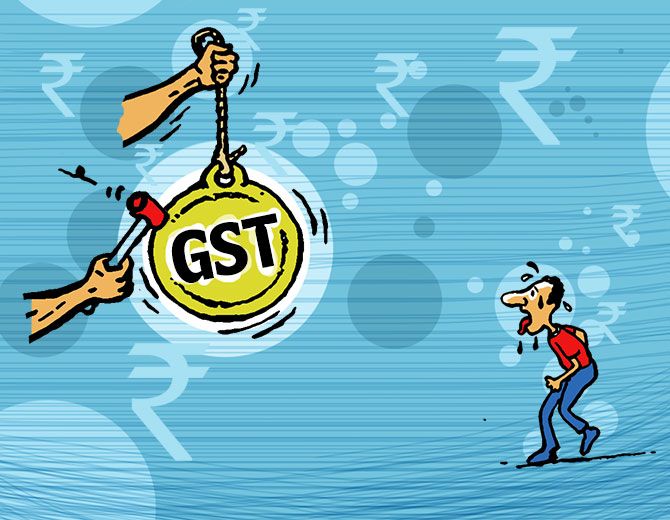'The professional or the freelancer needs to pay taxes from his pocket first and then wait for payments from his clients.'
Tinesh Bhasin and Jahnavi Bhatia report on the challenges GST's implementation will bring for two set of businesspersons.
Illustration: Dominic Xavier/Rediff.com

Professionals and freelancers will probably be the most impacted by the new goods and services Tax, GST. Many would need higher working capital and might need to enrol in multiple states.
And many who have online businesses are wondering whether they come under the ambit of the new tax regime.
"Those who come under GST need to file monthly returns. The bill settlement takes around 60 to 90 days. For service providers, it can be even longer. It means the professional or the freelancer needs to pay taxes from his pocket first and then wait for payments from his clients," says Sachin Menon, partner and head, indirect tax at KPMG. Even the rate is higher.
Professionals need to pay tax at 18 per cent under GST, compared to 15 per cent earlier.
If professionals and freelancers are raising invoices to those who don't come under the ambit of GST, the capital requirement is even higher.
In such cases, individuals need to pay GST through a method called reverse charge mechanism (RCM).
If the client does not have GST registration, the individual needs to raise an invoice to himself and pay the relevant tax.
"It may lead to increased borrowing by professionals and freelancers," says Varun Advani, chief operations officer, MakemyReturns.com.
Compliance hassles
Before the implementation of GST, an individual could deduct any business-related expenses such as stationery, office-related repairs, and so on, when paying income tax.
If you want to get deductions for any such expenditures now, you will need to make purchases or get repairs done from a GST-compliant shopkeeper or service provider.
If they are not compliant, you will need to do an RCM.
"This is one of the biggest hassles that professionals and service providers are facing in the GST regime. They will need to block their capital to claim credit for even smaller expenses," says V S Datey, senior consultant, Taxmann.com.
There's some relief though.
Transactions up to Rs 5,000 a day are exempt from these provisions.
An individual, therefore, needs to ensure office-related expenses are below Rs 5,000 a day.
Claiming credit can be complex
GST is a destination-based tax. It is levied where goods and services are consumed and will accrue to that state.
If the supplier of services and the receiver are in the same state, the transaction is simple.
The supplier will deduct Central GST (CGST) plus state GST (SGST), as it is an intra-state transaction.
But if the supplier and receiver are in different states, the supplier needs to deduct integrated IGST.
The entire tax goes to the Centre and it will then pass this to the states.
Under GST, professionals and freelancers who have an annual turnover of less than Rs 20 lakh are exempt. But this is applicable only if the services are provided in the same state.
If the services are inter-state, the supplier needs to register for GST irrespective of turnover, if he wants to claim credit for the tax paid.
"This is an additional burden on those with limited turnover," says Menon.
Due to bifurcation of the GST tax, professionals and freelancers might not be able to claim credit sometimes, despite paying the tax, if not registered in the particular state.
Say, an individual based in Mumbai travels to Bengaluru for meetings. He bears the cost of accommodation.
The invoice the hotel generates will be of CGST plus SGST. To claim credit for this tax paid, the professional needs to have a GST registration in the state.
Else, he will be able to claim the credit only on the CGST, but not on the SGST.
"One way out is if the client pays for the accommodation. Else, the person needs to do a separate GST registration in the state to claim credit," says Suresh Surana, founder, RSM Astute Consulting Group.
Many professionals and freelancers are also being wrongly advised that if they rendered their service by travelling to a client's office in a separate state, they should register there. It's because the service rendered is in a different state.
"While this has been a point of dispute among experts, it's not correct. Despite travelling to client's locations, a professional can raise a bill from his state," says Datey.
Lack of clarity for online services
Those running a blog or a video channel sign up for placement of advertisements for revenues. There's an intermediary that gets ads from different companies on the online real estate that belongs to such bloggers.
In such cases, it's not clear how the blogger or the owner of the video channel need to charge GST to the intermediary placing ads.
"It's the location of the intermediary that's of importance. If the intermediary is based anywhere outside India, such services can fall under the ambit of export. So, there's no tax. If the intermediary is in India but in a different state, the blogger might need to raise an invoice and charge IGST," says Archit Gupta, founder and chief executive officer, ClearTax.com.
Gupta says the government needs to clarify on the GST in such transactions.
Many freelancers source work from online Web sites such as Freelancer.com, Elance.com, and so on. These Web sites connect them with clients and payment is done on their platform.
Such a model is classified as e-commerce under GST.
Earlier, the government had said everyone registering on e-commerce platforms need to register for GST mandatorily.
"This provision has been on hold, as of now. The government may issue further clarifications. Freelancers are worried if they need to register for GST though their turnover could be as low as Rs 2 lakh to Rs 3 lakh," says Gupta.











